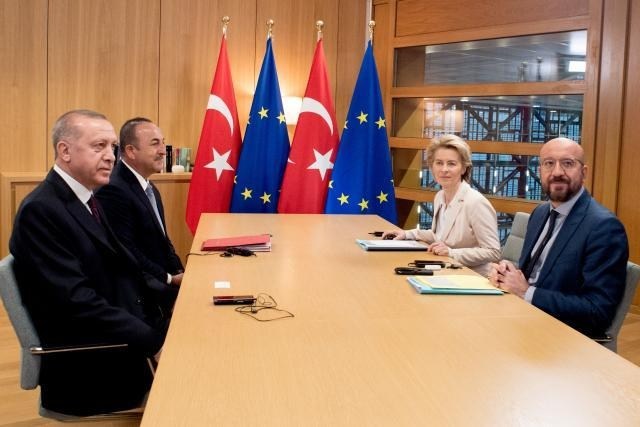In recent years EU and Turkey have disagreed on almost everything and the accession process has been suspended. On Monday, the two parties tried to restart a dialogue to overcome their many differences.
The recent outbreak of tension at the Greek-Turkish border and the humanitarian crisis in north-west Syria prompted Turkey’s president Erdogan to arrive in Brussels (9 March) to meet his European counterparts the discuss a de-escalation of the situation. The visit lasted two hours and he did not stay for the press conference. No statement was issued after the meeting.
European Council President Charles Michel described the meeting as an exchange of views on the relations between EU and Turkey, in particular the 2016 EU-Turkey agreement on migration. As a concrete outcome of the meeting, EU foreign policy chief Josep Borrell was tasked, together with Turkish foreign minister Mevlut Cavusoglu, to review the implementation of the agreement.
“The agreement remains valid,” said European Commission President Ursula von der Leyen”. “We discussed how to implement the missing pieces in the agreement.” She did not elaborate on which pieces were missing and did not confirm whether Turkey has agreed to close its side of the border with Greece for migrants.
“We are committed to move forward, provided that it’s reciprocal,” she said. “We are reviewing the whole agreement and trying to agree on the figures and facts though we might interpret them differently.”
Foreign media have reported that the Turkish authorities told migrants that the border was open and encouraged them to cross it. On the other side of the border, the Greek authorities did their best to push them back, allegedly using excessive force. For von der Leyen, it is matter of two points that go hand in hand: the respect for European borders and the right to apply for asylum.
The situation became even worse in Lesbos, where locals reacted against what the Commission itself describes as an unacceptable situation. After originally having welcomed migrants, locals took the law in their own hands, pushed back new migrants and harassed journalists and aid workers in the island. Greek police from the mainland were reportedly forced to leave the island.
The war in the Idlib region in north-west Syria, which the Assad regime with Russian air support is trying to retake, has caused a humanitarian crisis with up to one million people fleeing to the Turkish border and seeking shelter.
EU High Representative Borrell was visibly shocked at a press conference after the foreign affairs council meeting in Zagreb last week when he described the appalling situation in north-west Syria. EU can provide funding but it has become a matter of logistics and securing the aid through the Syrian-Turkish border where only one crossing point is open.
“We are grateful for the assistance from EU but it’s far from enough,” Turkish deputy foreign minister Faruk Kaymakci told The Brussels Times at a briefing last September. “We have spent $40 billion while EU has committed only €6 billion in assistance. There are 3,7 million Syrian refugees in Turkey and we cannot bear the burden alone.”
According to Cengiz Aktar, a Turkish professor in political science at National and Kapodistrian University of Athens, Turkey is pressuring EU on more funding for the resettlement of Syrian refugees in northern Syria and asking for EU support in the conflict there. Until now, EU has denounced Turkey’s military operations in northern Syria and its plan for forced resettlement there.
He told The Brussels Times that the 2016 EU-Turkey agreement needs to be revised, especially to make resettlement in Europe workable.
According to Commission figures from last year, 23,000 Syrian refugees in Turkey have been resettled in EU, 2,500 refugees of other nationalities have been returned to Turkey and 11,500 migrants have been returned to third countries. As regards the return of Syrian refugees to Turkey, the number was limited and only ca 350 had been returned.
M. Apelblat
The Brussels Times

